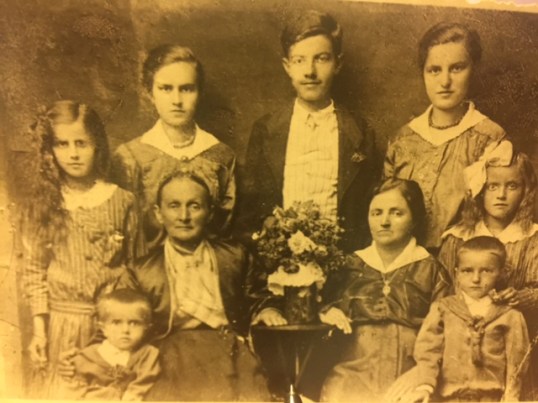True Love
 Sometimes when I watch movies or read novels or remember people I have known or even just observe people around me, I wonder if any couple ever experiences true love. I don’t mean young love, lust love, friendship love, family love, or any other kind of love that may or may not endure. No, I mean the kind of lasting love that truly embodies for better or for worse, the kind of love that elicits a smile whenever the beloved appears, the kind of love that makes one want to please the beloved and take away his or her pain, the kind of love that makes days away from the beloved achingly empty, the kind of love where one cherishes the very essence of the beloved no matter what time or misfortune or illness may have done to transform them. That kind of love. True love.
Sometimes when I watch movies or read novels or remember people I have known or even just observe people around me, I wonder if any couple ever experiences true love. I don’t mean young love, lust love, friendship love, family love, or any other kind of love that may or may not endure. No, I mean the kind of lasting love that truly embodies for better or for worse, the kind of love that elicits a smile whenever the beloved appears, the kind of love that makes one want to please the beloved and take away his or her pain, the kind of love that makes days away from the beloved achingly empty, the kind of love where one cherishes the very essence of the beloved no matter what time or misfortune or illness may have done to transform them. That kind of love. True love.
My aunt and uncle, Billy and Al Nikitovitch-Winer, are the only persons I know who share true love. (If you know other couples who do, please tell me about them. Perhaps we can start a #truelove chain to dissolve some of the hate that surrounds us.) Even though Billy and Al are in their early nineties, and Al has dementia, they seem to float on a sacred river of past and present love. When I visited them in July, after Billy had been hospitalized for a sudden collapse, what I observed made me marvel that love, even at the end of one’s days, can be so powerful.
Because he has always been a kind and gentle man, Uncle Al’s dementia elicits no anger or agitation in him, just a befuddled sweetness and apologetic forgetfulness touched by humor. And because Billy truly loves him, and has for more than 65 years, she treats him with the same respect and genuine solicitude she always has, whether or not he responds, understands or remembers.
When I first arrived in Lexington, Kentucky, frustrated after hours lost in a maze of dark, unfamiliar streets, they were waiting for me together, smiling and happy despite their recent ordeal. I left my heavy suitcase in the hall, and Billy told Al to please not carry it upstairs alone lest he hurt his back. But after she went to bed, he came into the kitchen where I was relaxing with a cup of tea and whispered, “I brought up your suitcase, dear.” When I protested, he said, “Don’t worry about me! It’s good for my muscles!” He flexed his skinny biceps and smiled that shy, ever-so-gentle smile I love so much.
In the morning, I accompanied Uncle Al on a short walk around the neighborhood while Billy slept and recuperated. It was easy to forget he had dementia of any sort as he chatted about this children and grandchildren, how many marathons he had run, how much he had loved teaching bio-chemistry at the University of Kentucky, and, most of all, how very remarkable his wife was. He stumbled a bit, and as I steadied him, he laughed and said, “Don’t worry, dear. If I fall down, just leave me there. They’ll pick me up with the trash!” He laughed, and I laughed along with him. That touch of black humor is what gives his dementia a spark of welcome awareness, one impossible not to notice and treasure.
Uncle Al’s dementia is not typical in many ways. He displays no anger, no restless despair, no extreme moodiness, just a constant smile, a cheerful countenance and a generosity of gesture rarely seen in anyone these days. We were resting on a bench in front of the house under the shade of an oak tree, savoring a bit of respite from the summer heat, when I mentioned their recent ordeal. He had slept on a cot next to Billy in the Intensive Care Unit and stayed with her until she was released the next afternoon after almost two days in the hospital. He didn’t remember any of it. “Really?” he asked. “I hope she’s okay. I better go in and check on her.” I realized in that instant that Uncle Al had answered all my questions and prompts with appropriate responses, whether or not he knew what to say or understood the context. It was as though every molecule in his body was designed for one purpose: to please.
Most mornings, after our little walks, Al would go to the kitchen and start to pour himself a bowl of Special K. I would remind him that we had had breakfast together earlier, and he would laugh softly. “Well, all right then!” His lingering smile held a sly acknowledgement of his memory loss. “So what,” he seemed to be saying. “I’m still here. I’m still smiling. Thank you for smiling with me.”
When he wasn’t talking, Al hummed to himself constantly, not a hum with a tune, just a “mm, mm” up and then a “mm, mm” down. Two hums up, two hums down, up and down, up and down, just under his breath. It soothed him in some way. Not being a saint on any level, I found it irritating at times, then felt disappointed with myself for being so easily irked by something so benign. How dare I let myself be irritated by someone I loved, someone who personified kindness?
Is being happy and kind with little memory of the past the same as living in the moment? The past is not completely erased for Al, just blurred around the edges. When he can’t remember something, he turns to Billy. “Memory is overrated,” he says. “Besides, I don’t need to remember everything. I have Billy for that.”
What cannot be erased is the love Al feels for Billy. He loves his wife with every look, every word and every gesture. He can no longer make her breakfast or dole out her vitamins or do much around the house to help her. He could not remember that she had been ill just days before and that they had been in the hospital together. But when we went for drives, he remembered to open the car door for her and help her reach her seat belt. And when we walked together in the park, he remembered to cradle her arm in his or hold her hand as if she were the most precious of women.
Every morning, according to Billy, if she has woken up as early as Al has, he has looked into her green eyes as if she were a goddess and said, “Good morning, lovely. You look so beautiful today!”
Uncle Al may sometimes forget my name when he sees me, but he never forgets to greet me with a smile and a kiss. He calls me “dear one” and tells me how “marvelous” I look. His essence as a gentleman and the kindest of souls has survived the ravages of his disease.
Billy is not irritated by Al’s humming or anything else he does or doesn’t do. She is sweet, patient, laughing, kidding, but never visibly annoyed. He may go out three times to get the mail. He may forget to turn off the garden hose until a small stream cascades down the driveway. He may disappear inexplicably right before dinner, leave five pairs of shoes by the door, wear the same torn Honolulu marathon t-shirt three days in a row, and hide things he finds in the most random places, yet she never raises her voice, speaks to him with condescension or expresses the slightest exasperation.
In reality, although she rarely shows it, Billy feels a deep sadness as the facets of Al’s intellect and personality disappear one by one. Who knows the extent of her sorrow or the heaviness of her burden caring for a man slowly reverting to childlike dependence? Physically, she is the weaker one, the one in constant pain from arthritis and the cumulative effects of severe scoliosis, but one would never know it. She watches him fade away, bit by bit, until I imagine all that will be left of him are a small smile and a huge heart beating for his beloved.
Although Billy is not afraid of dying, she is afraid of dying first and leaving Al alone. Who will love him and care for him the way she does? She is his everything, his touchstone, his reason for living. But if she dies first, who will be there to love and cherish and admire and respect her the way every woman wishes someone would, in sickness and in health, until the final parting? In this case, love has triumphed over dementia, untrammeled by memory loss, resplendent in its moment by moment renewal.
I can only hope that Billy and Al will die together the way they have lived together for so long: in true love.


 Since my father died, my inner light, the one that helped me see and feel, went out. I lived in a dark space, not unhappy, really, just dim. Shapes had lost their outlines, love had lost its purpose, and all the things that used to matter to me no longer did. Like a moth at twilight, I flitted silently, aimlessly, looking for any bright spot to move toward, searching for a spark that would brighten, however briefly, the nebula of my inner space.
Since my father died, my inner light, the one that helped me see and feel, went out. I lived in a dark space, not unhappy, really, just dim. Shapes had lost their outlines, love had lost its purpose, and all the things that used to matter to me no longer did. Like a moth at twilight, I flitted silently, aimlessly, looking for any bright spot to move toward, searching for a spark that would brighten, however briefly, the nebula of my inner space. Her name is Barbara, but she prefers to be called Bee. I see her at the gym, always with a smile on her face and a glow in her round chestnut eyes. She wears beige orthopedic shoes, black weight-lifting gloves, and matching polyester outfits in bright solid colors. When she sees someone working out on a machine or with weights, she ambles over, raises a tiny fist and says, “Stay strong!”
Her name is Barbara, but she prefers to be called Bee. I see her at the gym, always with a smile on her face and a glow in her round chestnut eyes. She wears beige orthopedic shoes, black weight-lifting gloves, and matching polyester outfits in bright solid colors. When she sees someone working out on a machine or with weights, she ambles over, raises a tiny fist and says, “Stay strong!”






